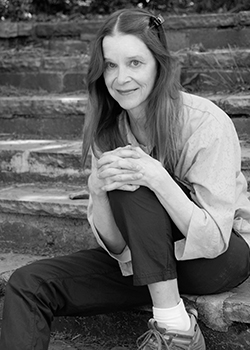|
1.
Last Sunday, the beautiful woman on TV, the soldier home from Iraq with shrapnel still deep in her brain, said doctors gave her one chance in a hundred to wake, one in a thousand to do more than bob and babble. And here she was, radiantly amazed, smiling sweetly.
Somebody had to be the one, she said. Why couldn't I do it?
In a tent, in a field hospital outside Baghdad, Jodee Beddia's surgeon cut a piece of bone from her skull so her swelling brain wouldn't kill her. Sewed it inside my abdomen, she said. To keep the bone alive. So nobody would lose it. Jodee Beddia flew home in a coma.
Now the bone is back in her head—she's stapled and sutured. Pain, yes, always. Like light, she says, cutting through me. She traces a line from between her eyes, up over the crown, through both temples. She smiles. It's only pain, a friend if you call it that, not so bad to be awake, alive today to feel it.
2.
The chickadee comes to the feeder. Even now, so close to twilight! Less than half an ounce of feather and hollow bone, ten drops of blood, heart smaller than a fingernail—yet she survives all night, every night, all winter.
3.
One bright day last fall, thirteen-year-old Rosanna Rios arrived at the hospital in time to give her heart and lungs—liver, spleen, pancreas, kidneys. In time to surrender her perfectly clear corneas and twenty-six inches of unscarred skin to save the lives, restore the sight, heal the burns of seven others.
Why should a sixty-nine-year-old man receive the heart of a child?
4.
Rescuers find one bruised baby in a field of tall grass, alive and unafraid after a tornado, this one of nine hundred lifted up and set down, everything destroyed around her.
5.
The tanager swoops tree to tree, gold and orange, black-winged, silent. Frogs chirp at dusk, and swallows dive, catching insects. Everything loves life:
bird, child, fish, mosquito—you hear the fluttery whoosh of your own heart:
Let your body rise.
Let the wind blow through you.
You will die. But not tonight. Tonight the whole world is here alive inside you, everything you've loved and lost: the white horse haloed in morning light; your child; your father; violet pansies blooming under snow, the ones you found in your mother's garden.
The thrush hidden in the woods holds one shimmering note so bright and clear you think the bird will shatter—and then it does shatter: into a heart-sparking ripple of song that splits down your bones and bursts from your body.
You speak now because you too are shattered, because the heart breaks, and breaks open. The people whose stories you hear, the miraculous beings you encounter, have fallen inside, and now, before you die, you hope to learn to love them. Imagining their lives is the path you walk to do this.
6.
I believe storytelling is a human impulse, not a choice, but a necessity. Unlike the old idea that memories are "wired" in the brain, synapses seared for (almost) all time, current research indicates that "reactivating a memory destabilizes it, putting it back into a flexible, vulnerable state."
In other words, every time you remember an episode of your life, you are reinventing it: embellishing, deleting, altering it through fusion and imagination.
If you cannot imagine, you cannot remember.
There is no such thing as "I."
Re-membering is transformation!
Every person on this earth is a storyteller.
Our memories are shifting collages, narratives spun from fragments, a ceaseless flow of images and associations, an explosion of sensory impressions, a web so splendidly complicated we have no hope of translating experience into language.
Yet we persist in trying to do so.
Every living being, human and more-than-human, is an infinite mystery.
Every moment of love is filled with the love of a lifetime.
7.
Now, as you read, some memory has come back to you. Now, in your own mind, you are inventing a story.
In Camera Lucida, Roland Barthes described the studium and punctum of a photograph. There are elements of composition and subject matter the photographer chooses consciously or deliberately. This is the studium.
And there are elements that pierce the frame by chance. For instance, the photographer is "shooting" Nicaraguan soldiers, and two nuns pass by in the background. This is the punctum, the unplanned, unchoreographed moment the photographer sees (gasping, no doubt, in wonder) and records. Barthes says the "adventure" of this photograph comes from the co-presence of these disparate elements.
Now, as you enter the adventure of your own memories, leave space for the unplanned, the unexpected, the piercing impressions that shatter the frames of individual lives.
Every story offers you the possibility of transcendence, the opportunity to imagine, to love the ones who have stepped into your frame and forever altered your experience.
We speak because we will die; but while we breathe on this earth, every moment is eternal.
Sources:
"Out of the Past," by Kathleen McGowan. The Best Science and Nature Writing 2010.
Camera Lucida, by Roland Barthes.
Mother Teresa: Lord, let my heart break open wide enough for the whole world to fall inside.
"The Red Poppy," by Louise Glück in The Wild Iris.
A shorter version of this essay appeared as: "Five Reasons to Tell a Story in 2011" in The Quivering Pen, edited by David Abrams
| 

